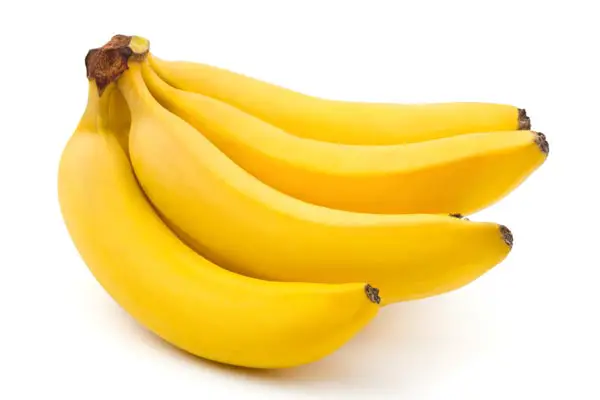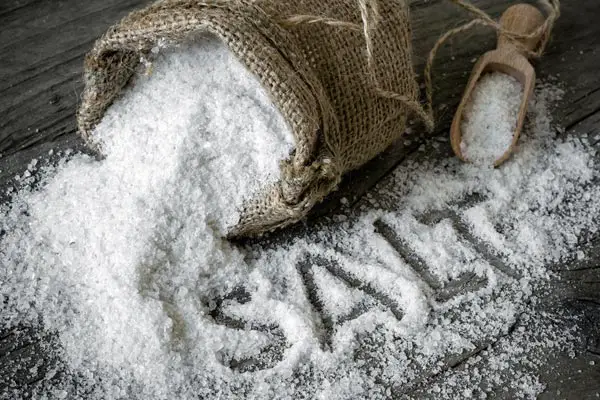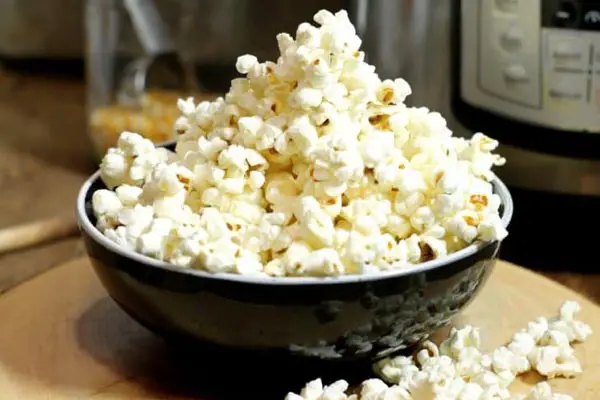Fido Goes Bananas!
Dog parents are always on the lookout for healthy ways to add variety to their fur kids’ diet or to reward them with treats. Many of the same foods that are good for humans are also good for dogs.
Just like humans, dogs can develop a variety of ailments or health conditions as a result of poor nutrition or an unhealthy diet.
Since our dogs rely on us to feed them, it’s important that we understand our dogs’ nutritional needs and provide them with the right foods to keep them healthy.
A dog’s diet consists in large part of the protein, but fruits and vegetables are also important to good canine health.
They are found in almost all pet products, providing needed vitamins and minerals, and bananas are no exception.
So, are bananas really good for dogs? And if so, how much banana should a dog eat? Are there risks associated with eating bananas?
What are some health facts about bananas?
Health benefits of bananas include heart health, digestive health, pectin that may protect from colon cancer, help with weight loss, help with preventing degenerative diseases, improved insulin sensitivity, help with preventing kidney stones, and help with muscle soreness.
Bananas contain potassium, magnesium, vitamin C, vitamin B6, fiber, biotin (vitamin B7) and copper. They are also low in sodium and cholesterol. Adding bananas to your dog’s diet can help him increase his intake of vitamins and minerals.
Can dogs get the same health benefits from bananas as humans?
Yes, dogs receive the same health benefits from bananas, including improved digestive health and energy levels. Bananas are an excellent food to add to your dog’s diet as long as they are fed in moderation.
What are the pros of feeding your dog bananas?
According to the National Center for Biotechnical Information, the extra fiber in bananas helps prevent gastrointestinal problems, promotes regular bowel movements, and can help with diarrhea.
Bananas are full of magnesium, which helps the body absorb vitamins, increases cellular energy production, builds protein, and promotes healthy bone growth in active dogs and puppies, according to veterinarians.
A study by the National Academy of Sciences on the nutritional needs of dogs shows that the potassium in bananas helps regulate fluid balance in the body and replaces lost electrolytes, and is beneficial for muscle development and blood vessel function.
The Vitamin C (ascorbic acid) in bananas helps build cartilage and protects cells from damage, and contains antioxidants that boost the immune system. Vitamin C also helps prevent degenerative conditions.
Bananas also contain a lot of Vitamin B7 (biotin). Another study by the National Center for Biotechnical Information shows that biotin helps with skin conditions such as dermatitis and scaly skin and promotes a healthy shiny coat.
The Vitamin B6 (pyridoxine) found in bananas can help dogs combat anemia and can increase the production of hormones, proteins, and neurotransmitters.
Active or athletic dogs can benefit from the natural sugars found in bananas. Since the body metabolizes these natural sugars quickly, they provide a natural energy boost.
Are bananas bad for dogs?
Bananas in moderation are not bad for dogs. They can be a healthy alternative to processed treats. Of course, too much of anything is bad so only feed your dog the recommended amount of banana for its weight. If in doubt, check with your veterinarian.
What are the cons of feeding your dog bananas?
Since bananas do contain sugar and carbohydrates, they should only be given as a treat rather than as a regular part of the dog’s diet.
The excess sugar and high carbohydrate content in bananas can lead to weight gain or insulin problems in older or less active dogs.
Too many bananas can also lead to gastrointestinal disorders, including constipation, gas, bloating, diarrhea, and vomiting. This is a result of too much fiber and potassium.
According to Kerri Marshall, DVM and chief veterinary officer for Trupanion Pet Insurance, bananas can be difficult to digest and can create a blockage if eaten whole or in large pieces. Dr. Marshall suggests that you watch for signs of gastrointestinal distress when adding bananas to your dog’s diet.
Because bananas contain a lot of natural sugar, eating too many bananas can result in hypoglycemia or other blood sugar irregularities in your dog.
A serious side effect of too many bananas is hyperkalemia, a high concentration of too much potassium in the blood.
According to a study by the National Center for Biotechnical Information, hyperkalemia can cause heart problems and cardiac arrest in dogs.
What are the symptoms of banana overdose?
Straining to pass a bowel movement, pain and discomfort, diarrhea and vomiting can all indicate a banana overdose. Signs of discomfort and pain include restlessness, whining, yelping, dilated pupils, and panting.
Hyperkalemia (high concentration of potassium in the blood) is a serious sign of overdose and symptoms include weakness, disorientation, and collapse.
If your dog displays any of the above symptoms, contact your veterinarian immediately.
How should you feed bananas to your dog?
You can feed your dog small pieces of banana on its own, mix it into your dog’s food, as dehydrated banana chips, or you can make your own homemade treats. Another good option is to mash the banana, stuff it in a Kong, and then freeze it.
Don’t go bananas! How many bananas can a dog eat in a day?
Small and toy dogs should only eat two to three small pieces per day. Medium to large dogs can eat up to half of a regular banana per day.
Working dogs and very active dogs can eat a little more since they are burning more calories throughout the day.
Can puppies eat bananas?
Since puppies have different nutritional requirements than adult dogs, they need a special diet that has been designed for proper bone growth and development. They can, however, eat bananas in small quantities as a treat.
How much banana can I give my puppy?
A puppy should only have a few small pieces of banana per day as a treat, about the same amount as for a small or toy dog.
Can my dog eat bananas peels?
While banana peels are not toxic to dogs, they do contain a lot of fiber which can be hard for a dog to digest.
Banana peels can also cause vomiting, constipation or an intestinal blockage. Because banana peels can be hard to chew, they can become stuck in your dog’s throat.
What should you do if your dog eats a banana peel?
If your dog does eat a banana peel, watch her to make sure she is having normal bowel movements. If not, you should take your dog to the veterinarian to check for any blockage in the intestinal system.
Are dried bananas or banana chips good for dogs?
Dehydrated banana chips can be a nutritious treat for your dog, just make sure they are all-natural as processed banana chips have a high sugar content and can contain a lot of preservatives. Feed small dogs 1-2 chips, medium dogs 6 chips, and large dogs 10 chips per day.
Will dogs eat frozen bananas?
Frozen bananas are a good alternative for dogs. Some dogs actually prefer the texture of a frozen banana to that of banana right out of the peel. Simply freeze a banana, then when you are ready to serve, peel and slice it into bite-sized treats.
Are dogs allergic to bananas?
Dogs are not usually allergic to bananas, but just like people, all dogs are different. When adding bananas to your dog’s diet, watch for signs of itchy skin, recurring ear infections and any non-stop scratching at ears, paws, face or back, all of which are signs of an allergy.
Are bananas poisonous to dogs?
No, bananas are not poisonous to dogs. As noted above, bananas in moderation are a healthy treat. If you have any doubts about adding bananas to your dog’s diet, discuss it with your veterinarian.
Can dogs eat banana bread?
A small amount of banana bread is probably ok, but some dogs are sensitive to grains or are allergic to wheat. Also, banana bread can have a lot of added sugar, so you don’t want to feed your dog too much. And make sure the bread does not contain raisins, which are toxic for dogs.
Check on these two videos on YouTube that provide helpful information and a quick overview of how and why to feed your dog bananas:
Can Dogs Eat Bananas?
Is It Safe for a Dog to Eat Bananas?
Banana Dog Treat Recipes
Below are some easy recipes using bananas that you can make at home for your dog.
Peanut Butter and Banana Dog Treats (Courtesy of WholeFoodsMarket.com)
Ingredients:
- 1 egg, beaten
- 1 peeled and mashed banana
- 3 tablespoons of peanut butter
- 1 cup of oat flour (alternate: coconut flour)
- 2/3 cup of rolled oats (alternate: coconut flakes)
- 1/2 cup dried parsley
- 1 tablespoon of honey (optional)
Instructions:
- Preheat oven to 300°F.
- Mix all of the ingredients in a bowl and let sit for approximately 5 minutes.
- Using a tablespoon, spoon out enough dough to roll into 24 balls and set on a baking sheet lined with wax paper.
- Use the back of the spoon to press the balls down to a 2″ “flat” disc.
- Bake for approximately 40-45 minutes and allow to cool when done.
- Store in a tightly sealed container in the refrigerator or freeze for a treat on a later date.
Nutritional Info:
Per Serving: Serving size: 1 each, 45 calories (15 from fat), 1.5g total fat, 10mg cholesterol, 10mgsodium, 6g carbohydrates, (1 g dietary fiber, 1g sugar), 2g protein.
Banana Kong Recipe (courtesy of AKC.org)
Ingredients:
- A ripe banana
- A scoop of peanut butter (first check that it doesn’t contain xylitol)
- A slice of mild cheese
- A blender
- A fillable toy, like a Kong
Instructions:
- Combine the banana, peanut butter, and cheese in the blender until it reaches a smooth consistency.
- Smear it over the toy, and freeze.
As a sweeter alternative, you can blend and freeze canned pumpkin, yogurt, a banana, and honey.
Frozen Banana Treats (courtesy of Moderndogmagazine.com)
Ingredients:
- 4 cups (32 fl oz/900 ml) plain, whole milk yogurt
- 2 tbsp peanut butter
- 3 ripe bananas, peeled and mashed
Instructions:
- Blend all the ingredients to a purée in a food processor.
- Pour into 4-oz/115-g plastic cups and freeze until firm.
- Pop the treat out of the cup and watch your dog enjoy!
The mixture can also be frozen inside stuffable chew toys (seal the tip with a dab of peanut butter first).
Nutritional information
Per cube: Calories 71; Protein 3 g; Carbohydrates 8.5 g; Dietary fiber 2.9 g; Fat 3.1 g
Frozen Fruity Pops
Ingredients:
- 4 1 qt/1.13 liters of fruit juice (not grape juice)
- 1 ripe banana, mashed
- 1 cup (4 fl oz/125 ml) plain, whole milk yogurt
Instructions:
- Blend the fruit juice with the mashed banana and mix in the yogurt.
- Pour into ice cube trays and put in the freeze.
- When frozen, pop out of the tray and serve one at a time.
Note: The Pops will keep for up to 1 month in the freezer.
It can also be frozen inside stuffable chew toys (seal the tip with a dab of peanut butter first).
Nutritional information
Per cube: Calories 31; Protein 0.2 g; Carbohydrates 7.2 g; Dietary fiber 0.1 g
Oatmeal Banana Cookies (courtesy of Pawstruck.com)
Ingredients:
- 3 cups oats
- 1 cup flour
- 2 eggs
- ½ cup honey (local honey is best)
- 2 bananas (mashed)
- Fun cookie cutters
Instructions:
- Mix together the eggs, honey, and bananas, either by hand or using a stand
- add the flour and oatmeal until all ingredients are mixed well
- form the batter into a ball and then roll it out using a well-floured rolling pin
- Cut out the cookies with different shaped cookie cutters
- Place the cookies on a non-stick cookie sheet and bake at 300 degrees for 25 minutes.
- Wait until the cookies are cool before serving






